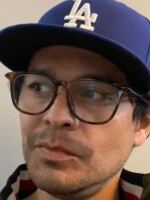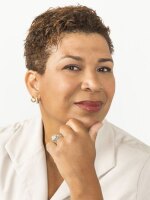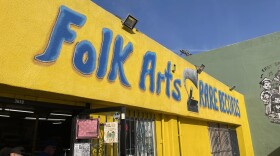Updated November 28, 2022 at 6:01 AM ET
The teams at NASA make discoveries and explore galaxies — and soon the agency will have a new venture here on Earth, piloting a full season of its first Spanish-language podcast in 2023.
Host and producer Noelia González tells NPR's Michel Martin that Universo Curioso de la NASA began as a bonus episode — in Spanish — for a series on the 2-year-old flagship podcast Curious Universe about last year's launch of the James Webb Space Telescope.
"That was literally the first Spanish podcast episode ever that NASA had done. And then we kept going from there," González says.
The podcast is part of the "NASA en Español" mission to include the voices of Spanish-speaking scientists and engineers as well as share science with the Spanish-speaking community. Members of the team are looking to compete in the podcasting space next year with more episodes and with consistent release dates that don't rely on other mission timelines, like the Artemis I launch earlier this month or the DART project.
González kicks off the episodes by telling listeners how NASA will take them on a journey through the cosmos — but in their language.
"Bienvenidos a un nuevo episodio de Universo Curioso de la NASA, en el que te llevamos a explorar el cosmos en tu idioma. Soy Noelia González y en este podcast, ¡la NASA es tu guía turística a las estrellas!"
González wants to inspire new audiences
For González, who studied science writing at the UC Berkeley Graduate School of Journalism, the work connects her multiple passions. She wants to share complex ideas with Spanish speakers, she says, "to show them that space is for all."
That includes highlighting the contributions the Hispanic community has had at the agency.
"These figures are not hidden. They are there. And we're trying to put them forward and speak about them and talk about their story, their journey to NASA," González says.
#Artemis I ya aguarda el despegue desde la plataforma de lanzamiento en @NASAKennedy.
— NASA en español (@NASA_es) November 15, 2022
Aprovecha la cuenta regresiva para aprender más sobre esta misión histórica con este episodio de Universo Curioso de la NASA: https://t.co/wGnLOdd2sD 🎧 pic.twitter.com/daceW3PJzd
As part of the Artemis I episode, she spoke with engineer Ivette Rivera Aponte about the Orion spacecraft's trajectory to the moon and the brainpower behind the mission.
González says she became a bit overwhelmed when the interview shifted to talk of the future — how it will be the next generation that powers humanity beyond the moon.
"She's basically saying that the kids that are now in school are the ones who are going to take us to Mars," González says of the conversation. "And so we have that in mind all the time when we communicate in Spanish."
The Spanish-language arm of NASA's communications team officially formed in 2019 after a grassroots effort by Hispanic workers at the agency who wanted to share what their contributions have been, according to a statement provided to NPR.
The agency's goal with NASA en Español "is to reach Spanish-speaking audiences in the US and worldwide who may not be familiar with the work NASA is doing," the statement reads.
"It's an opportunity to showcase how NASA's Hispanic experts contribute to its missions and inform audiences about how NASA projects impact their daily lives, from the production of the food they eat to their general understanding of the universe."
And the team wants to show the diversity within Latin America and the diaspora in the U.S.
"I've interviewed experts from Puerto Rico, Argentina, Guatemala, Spain and Chile. I'm Uruguayan. Many of them are immigrants — or their families are — coming from Latin America or Spain. They can not only speak about the specific mission they work on, but also about the process that led them to where they are now," González says.
Aponte, the engineer González spoke with about Artemis I, was raised in Long Island and earned her bachelor's degree in civil engineering at the University of Puerto Rico, Mayagüez.
You'll find González in other NASA media, too
Beyond her duties with Universo Curioso, González and her colleagues have developed content explaining what NASA's work in space materializes for humans on Earth.
The NASA en Español YouTube channel hosts videos like their explainer on weather data collection, which helps with forecasts — especially in moments of crisis.
In "¿Cómo estudia los huracanes la NASA?", there is a baseline explanation — all in Spanish — on how NASA's data-collecting instruments can provide life-saving assistance with pattern and storm intensity forecasts. It also includes a guide for Spanish speakers who live in hurricane-prone areas.
González says the work in this field leads to their ultimate goal "to help communities better prepare for natural disasters like these."
And she doesn't want NASA's Spanish-language approach to slow down with the launch of Universo Curioso.
"This is just the beginning. We will continue to highlight the agency's most exciting missions, while providing an intimate, behind-the-scenes access to the people working on these projects," she says.
Es un pequeño paso para González, pero un gran salto para los fanáticos de la ciencia.
Copyright 2022 NPR. To see more, visit https://www.npr.org. 9(MDAzMjM2NDYzMDEyMzc1Njk5NjAxNzY3OQ001))








